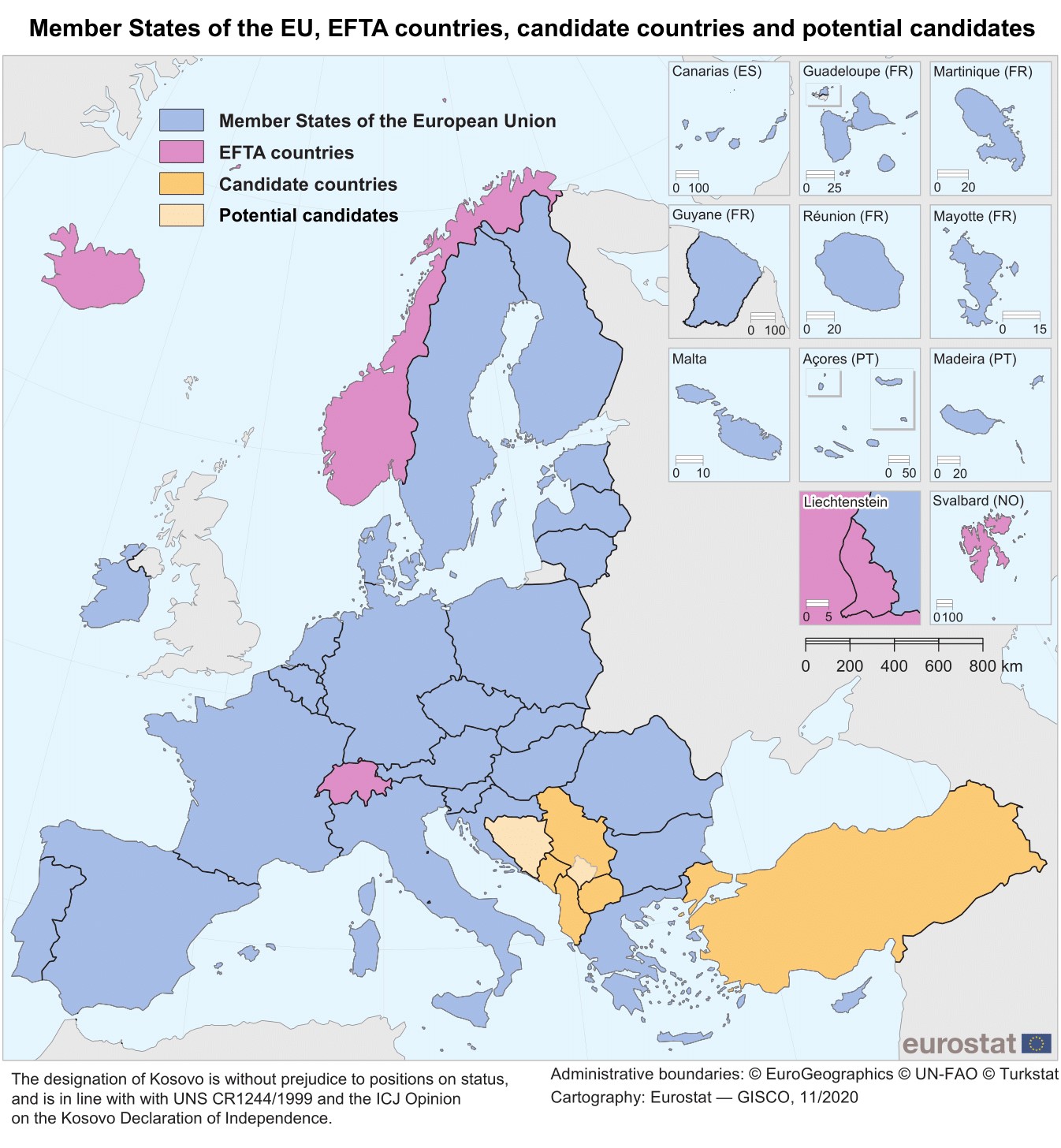The statistics published by Eurostat often include countries in and around Europe, which are not Member States of the European Union (EU). This is because statistical cooperation takes place with non-EU countries, which either are members of the European Statistical System, or are associated with EU enlargement or European neighbourhood policies.
In statistical publications, Eurostat normally lists countries according to the country group they belong to (EU Member State, EFTA State, candidate country or potential candidate).
European Statistical System
The European Statistical System (ESS) is the partnership between the Community statistical authority, which is the Commission (Eurostat), and the national statistical institutes and other national authorities responsible in each EU Member State for the development, production and dissemination of European statistics.
This partnership also includes the four countries represented by the European Free Trade Association (EFTA): Iceland, Liechtenstein, Norway and Switzerland. Iceland, Liechtenstein and Norway are ESS members through the European Economic Area (EEA) agreement; Switzerland is an ESS member through a bilateral agreement.
EFTA's Statistical Office is located in the premises of Eurostat and acts as a liaison office between the national statistical institutes of the EU Member States, Eurostat and the national statistical institutes of the three EEA-EFTA States (Iceland, Liechtenstein and Norway). In the field of statistical technical cooperation, EFTA's Statistical Office represents Switzerland, in addition to Iceland, Liechtenstein and Norway.
The United Kingdom
A new Trade and Cooperation Agreement between the European Union and the United Kingdom has been concluded as of 1 January 2021. It includes a provision on statistical cooperation that foresees the establishment of a specific arrangement (see: Article UNPRO.5.2 on Statistical cooperation).
Until this arrangement on statistical cooperation is established, addressing in particular the scope and means of data transmission, there will be changes for the dissemination of UK data by Eurostat, with the exception of cases foreseen in the Protocol on Ireland/Northern Ireland. Until then, Eurostat will no longer disseminate new data for the UK, neither through its database nor in other dissemination products.
EU Enlargement Policy
Outside of the EU, several countries have the status of being "candidate countries" and are in the process of joining the EU, while others are potential candidates. The current candidate countries are Montenegro; North Macedonia; Albania; Serbia and Türkiye. The potential candidates are Bosnia and Herzegovina and Kosovo (This designation is without prejudice to positions on status, and is in line with UNSCR 1244/1999 and the ICJ Opinion on the Kosovo declaration of independence).
Eurostat follows the progress of candidate countries and potential candidates in complying with the EU acquis in the field of statistics and collects and publishes data from these countries. In addition, Eurostat provides technical assistance and support to the national statistical institutes of each candidate country and potential candidate to enable them to produce and disseminate harmonised data of high quality according to European standards.
European Neighbourhood Policy
The European Neighbourhood Policy (ENP) was launched in 2003, developed throughout 2004 and revised in 2015. The objective of the ENP is to avoid the emergence of new dividing lines between the enlarged EU and its neighbours and instead strengthen the prosperity, stability and security of all. The main objective of the cooperation in statistics with ENP countries is to set up a continuing process of statistical harmonization to allow gradual convergence towards harmonised and comparable economic and social data as well as to increase compliance with European and international standards.
The ENP covers 16 countries, divided into two regional groups:
- ENP-East countries: Armenia, Azerbaijan, Belarus, Georgia, Moldova and Ukraine.
- ENP-South countries: Algeria, Egypt, Israel, Jordan, Lebanon, Libya, Morocco, Palestine, Syria and Tunisia.
For more information:
- Eurostat website section dedicated to international cooperation
- Overview of the European Statistical System
- EFTA Statistics
- European Economic Area
- Enlargement Policy
- European Neighbourhood Policy
To contact us, please visit our User Support page.
For press queries, please contact our Media Support.


